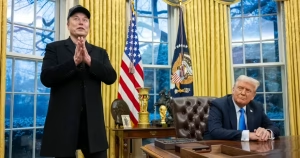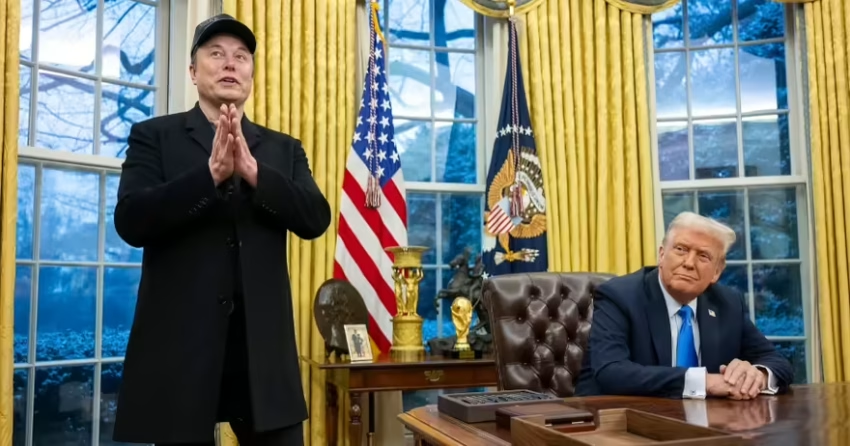Michelle King’s recent resignation from the Social Security Administration (SSA) is part of a growing trend of high-ranking officials leaving their organizations that Elon Musk’s Department of Government Efficiency (DOGE) has been investigating. After turning down DOGE’s request to view extremely private government documents at the SSA, King resigned. Social Security numbers, bank account information, wage records, dates of birth, marital status, and, in certain situations, medical records related to disability benefits were among the data in question, according to people familiar with the matter.

King was replaced because she refused to provide access to such private and sensitive information, according to Nancy Altman, president of Social Security Works, an advocacy organization that focuses on Social Security, Medicare, and Medicaid. Instead of being fired outright, Altman indicated that King’s resignation was a personal response to the White House’s decision to deny her a position. “The Social Security Administration has a lot of personal data that most people would like to keep private and they entrusted to the government through tax returns and their employers sending in earning statements,” Altman added, underscoring the gravity of the breach. It is assumed that the government will handle it with extreme caution.
President Trump chose Frank Bisignano to head the SSA, and White House spokesperson Harrison Fields confirmed King’s departure in a statement. Fields noted that a career anti-fraud specialist would operate as acting commissioner in the interim and that Bisignano is anticipated to be approved quickly. “President Trump is committed to appointing the best and most qualified individuals who are dedicated to working on behalf of the American people, not to appease the bureaucracy that has failed them for far too long,” Fields added, emphasizing his commitment to selecting highly qualified individuals who would act in the best interests of the American people.
King’s departure is the most recent in a string of senior officials’ departures from agencies that DOGE has been looking into. Under Elon Musk’s direction, the Department was established with the mission of examining government operations, particularly those at the Social Security Administration (SSA), which handles payments for more than 70 million Americans. Despite President Trump’s promise not to reduce retirement benefits, DOGE’s investigations raise the possibility that the SSA is experiencing massive fraud. Trump instructed Musk and the DOGE team to find fraud at the SSA, according to White House press secretary Karoline Leavitt. Leavitt stated that although the team had not thoroughly examined the agency’s data, they had serious suspicions of fraud.
Only 0.84% of benefits payments from 2015 to 2022 were unlawful, according to a report issued in July by the SSA’s inspector general. This suggests that systemic fraud may not be as pervasive as some have suggested. However, there are still issues with DOGE’s assertive approach to gaining access to private government information.
Over time, DOGE’s relationship with government agencies has become more tense, and other departments are now being scrutinized. Concerns over privacy concerns were raised earlier this month when it was discovered that an IRS employee with a DOGE affiliation was requesting access to private taxpayer data. The Treasury Department’s payment system, which contains private financial data including Social Security numbers, was also accessible to DOGE. DOGE was accused of breaking federal privacy rules in a number of lawsuits that followed this action. In response, DOGE’s access to Treasury systems was briefly limited by Justice Department lawyers, who only allowed two employees “read-only” access to data when necessary. A judge also temporarily blocked access to sensitive data in the Treasury Department for special government employees, including DOGE personnel, and political appointees.
Beyond the SSA, DOGE’s operations are a source of dispute. According to Secretary of Homeland Security Kristi Noem, Musk was given permission by President Trump to examine Federal Emergency Management Agency (FEMA) disaster data. This further illustrates DOGE’s growing power and reach over several government departments. There are growing worries about the long-term effects of DOGE’s practices as more top officials leave or are replaced. Opponents contend that granting private sector executives, such as Elon Musk and his group, unfettered access to confidential government data could jeopardize the security and privacy of citizens.
Michelle King’s resignation from the SSA is a turning point in a growing trend of high-level government agency departures that Elon Musk’s Department of Government Efficiency is monitoring. The scenario demonstrates the conflict that exists within the US government between efficiency reforms and sensitive data protection. As these developments take place, a major topic of discussion in the upcoming months will be how to strike a balance between openness, public accountability, and American residents’ privacy.
Michelle King’s recent resignation from the Social Security Administration (SSA) is part of a growing trend of high-ranking officials leaving their organizations that Elon Musk’s Department of Government Efficiency (DOGE) has been investigating. After turning down DOGE’s request to view extremely private government documents at the SSA, King resigned. Social Security numbers, bank account information, wage records, dates of birth, marital status, and, in certain situations, medical records related to disability benefits were among the data in question, according to people familiar with the matter.
King was replaced because she refused to provide access to such private and sensitive information, according to Nancy Altman, president of Social Security Works, an advocacy organization that focuses on Social Security, Medicare, and Medicaid. Instead of being fired outright, Altman indicated that King’s resignation was a personal response to the White House’s decision to deny her a position. “The Social Security Administration has a lot of personal data that most people would like to keep private and they entrusted to the government through tax returns and their employers sending in earning statements,” Altman added, underscoring the gravity of the breach. It is assumed that the government will handle it with extreme caution.
President Trump chose Frank Bisignano to head the SSA, and White House spokesperson Harrison Fields confirmed King’s departure in a statement. Fields noted that a career anti-fraud specialist would operate as acting commissioner in the interim and that Bisignano is anticipated to be approved quickly. “President Trump is committed to appointing the best and most qualified individuals who are dedicated to working on behalf of the American people, not to appease the bureaucracy that has failed them for far too long,” Fields added, emphasizing his commitment to selecting highly qualified individuals who would act in the best interests of the American people.
King’s departure is the most recent in a string of senior officials’ departures from agencies that DOGE has been looking into. Under Elon Musk’s direction, the Department was established with the mission of examining government operations, particularly those at the Social Security Administration (SSA), which handles payments for more than 70 million Americans. Despite President Trump’s promise not to reduce retirement benefits, DOGE’s investigations raise the possibility that the SSA is experiencing massive fraud. Trump instructed Musk and the DOGE team to find fraud at the SSA, according to White House press secretary Karoline Leavitt. Leavitt stated that although the team had not thoroughly examined the agency’s data, they had serious suspicions of fraud.
Only 0.84% of benefits payments from 2015 to 2022 were unlawful, according to a report issued in July by the SSA’s inspector general. This suggests that systemic fraud may not be as pervasive as some have suggested. However, there are still issues with DOGE’s assertive approach to gaining access to private government information.
Over time, DOGE’s relationship with government agencies has become more tense, and other departments are now being scrutinized. Concerns over privacy concerns were raised earlier this month when it was discovered that an IRS employee with a DOGE affiliation was requesting access to private taxpayer data. The Treasury Department’s payment system, which contains private financial data including Social Security numbers, was also accessible to DOGE. DOGE was accused of breaking federal privacy rules in a number of lawsuits that followed this action. In response, DOGE’s access to Treasury systems was briefly limited by Justice Department lawyers, who only allowed two employees “read-only” access to data when necessary. A judge also temporarily blocked access to sensitive data in the Treasury Department for special government employees, including DOGE personnel, and political appointees.
Beyond the SSA, DOGE’s operations are a source of dispute. According to Secretary of Homeland Security Kristi Noem, Musk was given permission by President Trump to examine Federal Emergency Management Agency (FEMA) disaster data. This further illustrates DOGE’s growing power and reach over several government departments. There are growing worries about the long-term effects of DOGE’s practices as more top officials leave or are replaced. Opponents contend that granting private sector executives, such as Elon Musk and his group, unfettered access to confidential government data could jeopardize the security and privacy of citizens.
Michelle King’s resignation from the SSA is a turning point in a growing trend of high-level government agency departures that Elon Musk’s Department of Government Efficiency is monitoring. The scenario demonstrates the conflict that exists within the US government between efficiency reforms and sensitive data protection. As these developments take place, a major topic of discussion in the upcoming months will be how to strike a balance between openness, public accountability, and American residents’ privacy.
